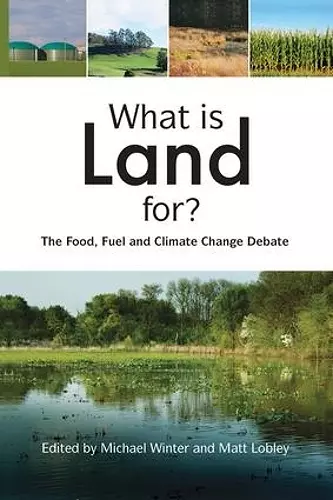What is Land For?
The Food, Fuel and Climate Change Debate
Michael Winter editor Matt Lobley editor
Format:Paperback
Publisher:Taylor & Francis Ltd
Published:22nd May '15
Currently unavailable, and unfortunately no date known when it will be back
This paperback is available in another edition too:
- Hardback£145.00(9781844077205)

In recent decades agricultural commodity surpluses in the developed world have contributed to a mantra of 'land surplus' in which set-aside, extensification, alternative land uses and 'wilding' have been key terms in debates over land. Quite suddenly all this has changed as a consequence of rapidly shifting commodity markets. Prices for cereals, oil seeds and other globally traded commodities have risen sharply. A contributor to this has been the shift to bioenergy cropping, fuelled by concerns over post-peak oil and climate change. Agricultural supply chain interests have embraced the 'new environmentalism' of climate change with enthusiasm, proudly proclaiming the readiness of the industry to produce both food and energy crops, and to do so with a neo-liberal confidence in markets to determine the balance between food and non-food crops in land use.
But policy and politics have not necessarily caught up with these market and industry-led changes and some environmentalists are beginning to challenge the assumptions of the new 'productivism'. Is it necessarily the case, they ask, that agriculture's best contribution to tackling climate change is to grow bioenergy crops or invest in anaerobic-digesters or make land over for windfarms? Might not there be an equally important role in maximising the carbon sequestration or water-holding properties of biodiverse land? What is Land For? tackles these key cutting-edge issues of this new debate by setting out a baseline of evidence and ideas.
'Sustainable land use is the first 'tipping point' to be faced over the whole globe...This volume helpfully sets the scene for a new sustainable land revolution.'
Tim O'Riordan, Emeritus Professor of Environmental Studies, University of East Anglia, UK
'If you want informed reflection on today's crucial debates, policy-making and planning about land use, this book is well worth a read.'
Country Way Magazine
'This is the type of book that makes you revise your lecture notes. Although I continue to rehearse arguments about post-productivism and countrysides of consumption, I am aware that I sound increasingly unconvincing. Whilst not yet able entirely to consign these concepts to history, it is instructive to read a book that says, basically, society faces a range of real and urgent problems, the answer to which lies in the soil.'
Journal of Environmental Policy and Planning
ISBN: 9781138881228
Dimensions: unknown
Weight: 521g
360 pages